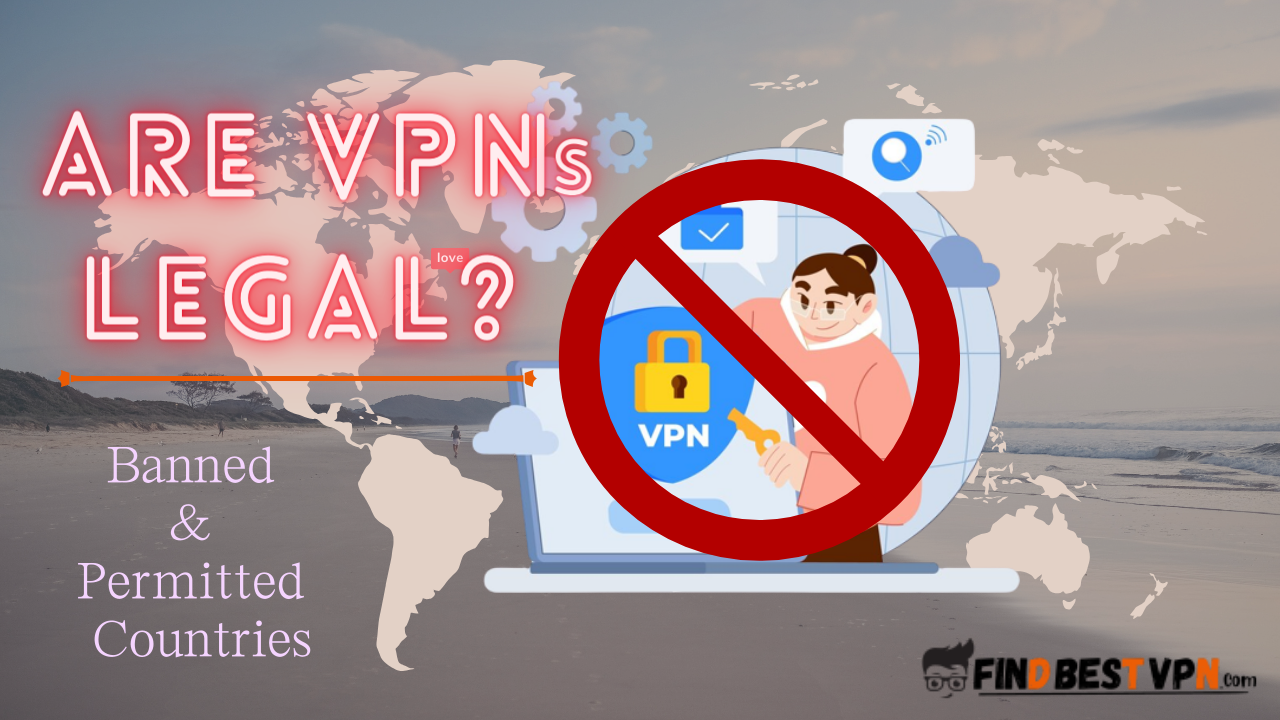
Are VPNs Legal? Complete List Of Banned And Permitted Countries
Virtual Private Networks (VPNs) are legally accepted in most countries, with a few exceptions in authoritarian states with stringent Internet censorship, such as North Korea and Iraq.
Additionally, certain countries impose restrictions on VPN usage; for example, the Chinese government permits only state-approved VPNs and blocks other providers.
Despite VPNs, users can still face legal consequences if they engage in cyberattacks, distribute copyrighted material, or online harassment through a VPN.
It is essential to note that many VPN providers retain user logs and may be obligated to disclose data to government agencies when required.
This article delves into finding countries where VPN is banned, highlighting where they are against the law and which nations impose partial restrictions.
Furthermore, recommendations for selecting VPNs capable of bypassing firewalls and censorship are provided.
Are VPNs Legal?
Yes, VPNs are legal in most countries. However, some authoritarian governments impose a blanket ban on VPNs, considering privacy tools as a threat to their regimes.
Utilizing a VPN in countries where they are prohibited can lead to serious consequences, such as facing fines or imprisonment.
Caution is advised, and checking local laws is essential before selecting a VPN provider.
Are VPNs Legal In US?
Additionally, certain countries, like China and the UAE, implement partial restrictions rather than a complete ban on VPNs.
For instance, China has restricted access to most commercial VPNs and permits only those registered by the government.
However, some users can still unofficially access many VPN services in China.
What Countries Ban VPN?
Primarily, those with authoritarian governments aiming to maintain control over Internet users are those countries that banned VPN.
VPNs can undermine mass surveillance efforts, allowing people to access blocked websites, maintain anonymity, and freely express opinions.
As a result, oppressive regimes restrict or ban digital privacy tools.
Even in countries where VPNs are allowed, they cannot be used for illegal activities such as downloading copyrighted material or cyberbullying.
It’s worth noting that VPN restrictions in certain areas, such as colleges and workplaces, do not necessarily make VPN usage unlawful.
These restrictions often aim to control VPN traffic and block access to specific websites to prevent distractions.
Are VPNs legal in countries with strict censorship laws and oppressive governments seeking to monitor citizens’ Internet activities? Some countries where VPNs are illegal include:
- North Korea– Known for censorship, North Korea limits citizens to a national intranet called “Kwangmyong.” The legality of VPNs in North Korea needs to be clarified.
- Russia– Strict laws on VPNs require government approval, and unapproved VPNs can result in fines.
- Myanmar– Considered unofficially illegal, there have been reports of arrests for installing unauthorized VPNs.
- Belarus– Although not explicitly declared unlawful, there is a crackdown on VPN usage in Belarus.
- Iraq- The Iraqi government has declared VPNs unlawful to prevent manipulation by terrorist groups.
Which Are The Countries With Restricted VPN Access?
Most countries do not completely ban VPNs but impose specific restrictions, often allowing only certain providers to operate. Some countries with partial VPN restrictions include:
- China– Are VPNs legal in china? While not technically illegal, China has cracked down on unlicensed VPN providers, and social media websites are restricted even on government-approved VPNs.
- Iran– VPN usage is permitted only with government-approved providers, creating challenges for accessing blocked sites.
- Jordan– VPNs are allowed but temporarily blocked in certain areas during unrest.
- Oman– It is unlawful to use unlicensed VPNs; only licensed VPNs are allowed due to heavy Internet censorship.
- Sri Lanka– VPNs are allowed, but the government tends to block social media websites during crises.
- Turkey– While not technically illegal, the government has become stricter and blocked some VPN providers.
- Turkmenistan– Are VPNs legal here? VPNs are not illegal but may face temporary blocks due to active government surveillance.
- Uganda– VPNs are allowed, but the government has blocked several VPNs and social media apps.
- United Arab Emirates– VPNs are not restricted, but specific laws address usage for activities like watching pornography and cyberbullying.
- Venezuela– While legal, VPNs have faced blocks, especially popular ones, by ISPs.
Can A Country Ban VPN, How?
Yes, a country can ban VPN or restrict them. The process includes:
- Physical checks- Local law enforcement may conduct physical checks on devices that are VPNs legal and to identify VPN usage.
- Deep Packet Inspection (DPI)- ISPs can use DPI to identify and block VPN traffic in collaboration with the government.
- Blocking apps and websites- Governments may block VPN websites and applications to prevent downloads.
- Fining citizens- Fines are imposed on users for using unlicensed VPNs, coercing compliance with local laws.
- Data sharing requirements- Governments may ask VPN providers to regularly share user data to grant licenses, limiting user options to government-approved VPNs.
Consequences Of Using A VPN Illegally
In VPN, banned countries using a VPN illegally can face severe consequences, including imprisonment or fines, depending on the country’s strictness.
In countries where VPN applications are banned, accessing them on personal connections or public Wi-Fi could be dangerous and unlawful.
Best VPNs To Bypass Firewalls And Censorship
Recommended VPNs for bypassing firewalls include:
PureVPN
PureVPN – is a real heavy hitter in the VPN game. With servers scattered around the globe, PureVPN makes light work of sidestepping firewalls.
It’s like your secret tunnel to access whatever you want online, all while keeping your privacy on lockdown.
Plus, it’s a breeze to use, so you won’t be tearing your hair out trying to figure things out.
NordVPN
NordVPN is a big name in the VPN scene. If you’re after top-notch security and the power to go through even the toughest firewalls, NordVPN is your go-to.
They’ve got this military-grade encryption thing going on, turning your online experience into a censorship-free zone.
The cherry on top? A super user-friendly interface and a network of servers will make your head spin (in a good way).
CyberGhost VPN
CyberGhost VPN is the people’s choice. These guys have strategically placed servers that practically scream, “No more restrictions!”
User privacy is their jam; they make it all happen with a simple, easy-to-navigate interface.
With CyberGhost VPN, you get the best of both worlds – a world without censorship and a speedy and secure world.
CyberGhost VPN is known for its user-centric approach. CyberGhost’s specialized servers are strategically located to provide users unrestricted access to content worldwide.
Final Thoughts
Are VPNs legal? VPNs are generally allowed in most countries, but specific nations impose bans or restrictions to maintain political stability, control over citizens, and national security.
It’s crucial to be aware of local laws before choosing a VPN provider.
A premium VPN with obfuscated servers is recommended for navigating restrictions, and PureVPN is a top choice due to its advanced security features.
Remember that the legality of VPNs can vary, so checking local regulations is crucial.



















